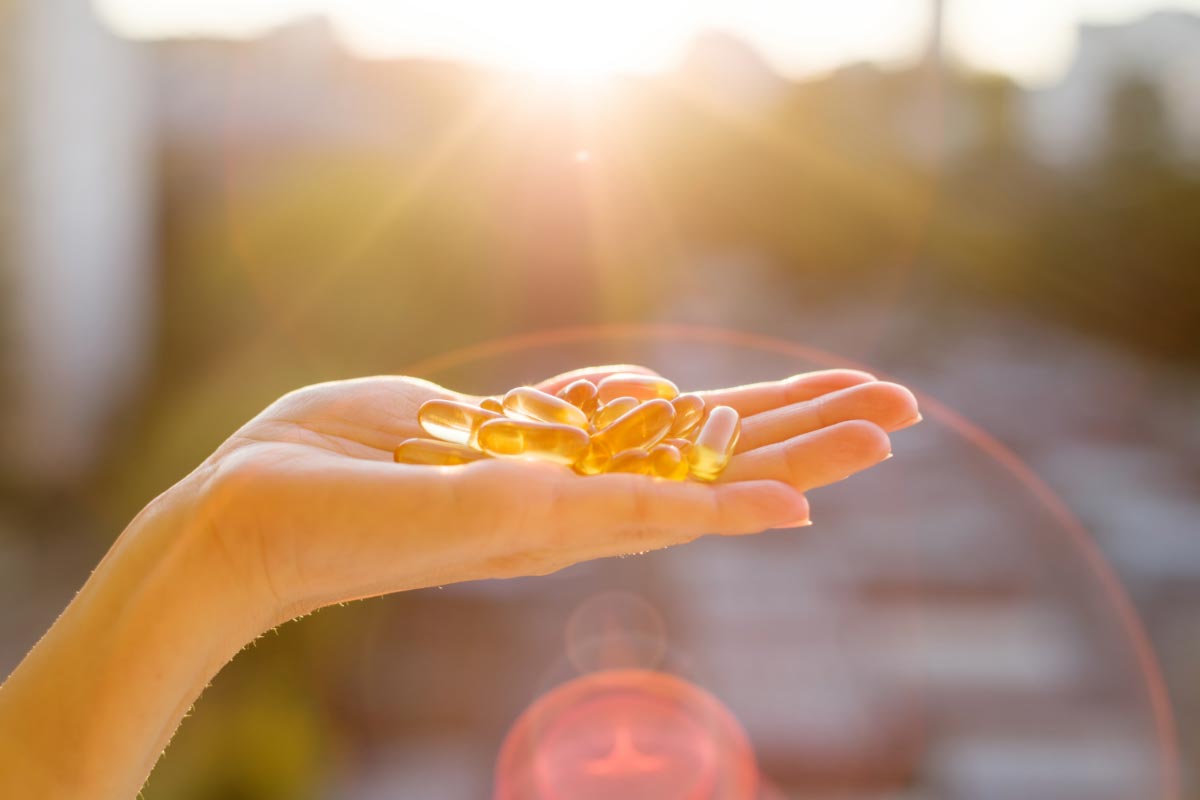Vitamin D is a fantastic fat-soluble vitamin that helps prevent cancer, increase bone health and can even prevent heart attacks. You can get vitamin D from supplementation or naturally from sun exposure.
However, if you live in the northern hemisphere, you probably don’t ever get enough vitamin D. This is because both Vitamin D supplements and the sun aren’t as popular north of the equator. Thus, it becomes imperative to supplement with vitamin D whenever possible.
Best Vitamin D Supplements
1. Essential Elements D3
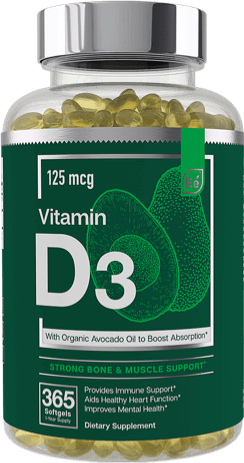
With 125mcg (5000 IUs) of Cholecalciferol per serving, Essential Elements provides one of the most potent vitamin D3 supplements on the market to lower blood pressure, body bone health, and keep your heart healthy.
Every serving comes with avocado oil, helping to ensure the vitamin D3 gets where it needs to go in the body. There is no gluten, dairy, soy, or preservatives included int eh capsule, and every batch is backed by 3rd party testing. With 365 capsules per bottle, you’ll be able to go a whole year before needing a refill.
For all these reasons and more, Essential Elements D3 takes Healthtrends #1 spot for the best vitamin D3 supplement on the market.
2. Nuzena Solar Essence
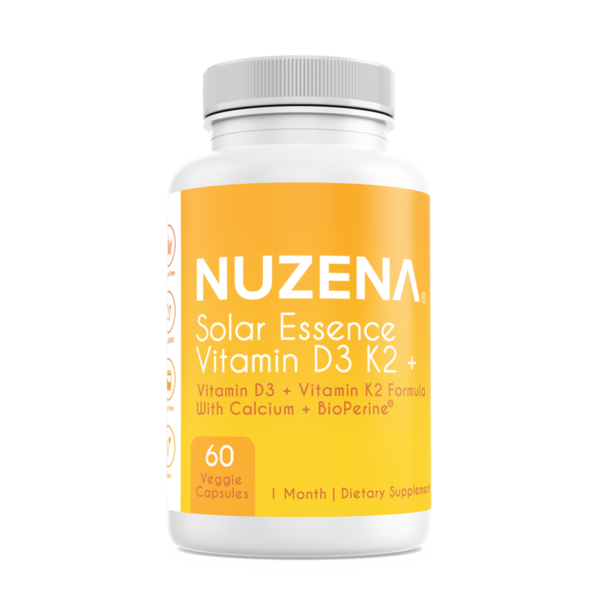
Solar Essence by Nuzena is a potent vitamin D supplement that contains 5000 IU of vitamin D per serving. It’s also packed with vitamin K2, BioPerine, and calcium to dramatically improve the absorption and bioavailability.
All of Nuzena’s formulas are non-GMO, gluten-free, and produced in FDA registered facility that adheres to GMP guidelines.
3. TransparentLabs RawSeries Vitamin D3
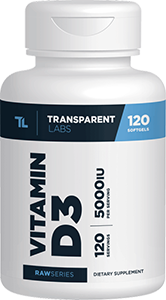
Each pill consists of 5,000 IUs of vitamin D. This dosage is more than enough, and since there are 120 pills per bottle, you’ll be able to go months without needing a refill.
When you look at the ingredients list you’ll see exactly what you want to see: one single ingredient. This is pure vitamin D3, an ideal supplement. There are no artificial preservatives, coloring, or sweetener and is non-gluten and non-GMO.
4. Nordic Naturals Vitamin D3
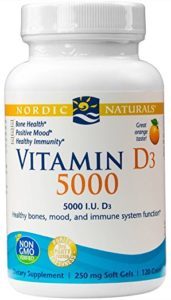
Nordic offers a few different choices when it comes to Vitamin D3. You’ll be able to get a bottle with 1,000 IU dosage pills or a bottle with 5,000 IU dosage pills. Each bottle comes with 120 pills. Additionally, Nordic makes vitamin D3 gummies. These are 1,000 IUs and make it a heck of a lot easier to convince your kids to take the helpful supplement.
The company uses extra virgin olive oil in their formula to deliver the vitamin into your bloodstream.
5. Smarter Vitamins D3 (Avocado Oil)
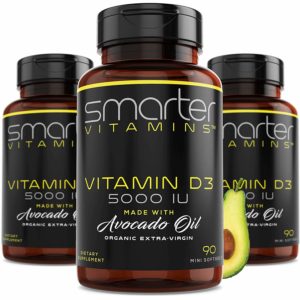
One thing which sets this product apart is that these pills are made with avocado oil. Many of the other products are made with different types of oil such as olive oil or canola oil. This could be a major selling point for a lot of individuals.
The value is great when you take into consideration that Smarter Vitamins comes with 3 bottles. Each pill is packed with 5,000 IUs of vitamin D3 and each bottle contains 90 pills.
6. Smarter Nutrition Vitamin D3 + K2
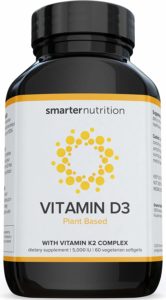
Unlike other Vitamin D pills that are excreted from sheep’s glands, then chemically processed, Smarter Nutrition’s Vitamin D3 comes from the most premium plant source of active Vitamin D3. They also added a vitamin K2 complex to their smarter formula to give you a product that supports complete bone health.
Vitamin D3 pulls calcium into the bloodstream, but it’s actually vitamin K2 that pushes calcium from your blood and into your bones. Smarter Nutrition Vitamin D3 is encapsulated in vegetarian soft gels with organic extra virgin coconut oil for faster bioavailability than powdered products.
7. Sports Research Vitamin K2 + D3
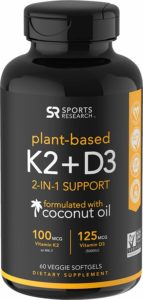
Sports Research Vitamin K2+D3 sources its vitamin D3 from lichen and menaQ7 vitamin K2 from chickpea. To help enhance absorption Sports Research blended its product with coconut oil.
Sports Research K2+D3 is also the only non-GMO verified, vegan certified, 100% plant-based vitamin K2+D3 available.
8. Naturewise Vitamin D3
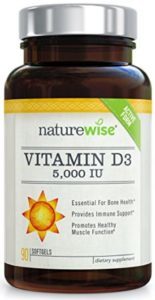
NatureWise vitamin D3 comes with 360 pills, all of which are filled with 5,000 IUs of vitamin D3. Considering the dosage and the serving size offered by Naturewise, this is probably the best value you’re going to get.
Naturewise is also a well-known and reputable supplement company. You can trust that you are getting exactly what is being advertised. There are no fillers and artificial ingredients in this formulation.
9. Nature’s Bounty Vitamin D3
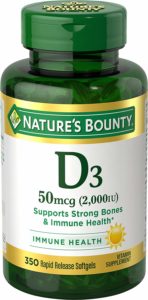
Nature’s Bounty is directly comparable to Naturewise in the sense that it is another reputable supplement company and the product is very similar.
The major difference here is that this particular Nature’s Bounty bottle comes with 2,000 IU pills rather than 5,000 in the supplement above. 2,000 can be preferred for some people who don’t require such a high dosage.
10. Bronson High-Potency Vitamin D3
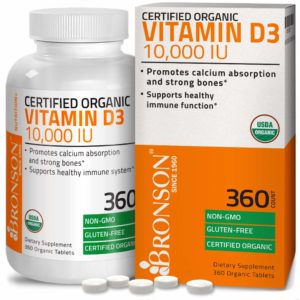
Bronson has been around since the 1960s and they have a good reputation as a supplement company. Whereas all of the products above range from 1,000 IUs to 5,000 IUs, this supplement offers 10,000 IUs of vitamin D per pill.
For many people, this won’t be necessary. However, some individuals do need to take high dosages and so this product makes the most sense.
11. Olly Sunny Vitamin D Gummy
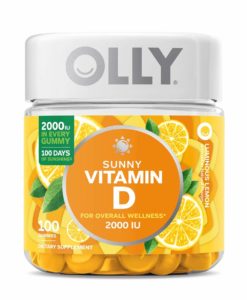
Between the packaging and the taste, this supplement is one of the best available options in terms of getting kids to take and enjoy vitamin D. OLLY vitamin D gummies come in an orange flavor and fun packaging.
The dosage is 2,000 IUs which is a solid amount. You’ll probably only need to take one pill per day.
12. Solimo Vitamin D3
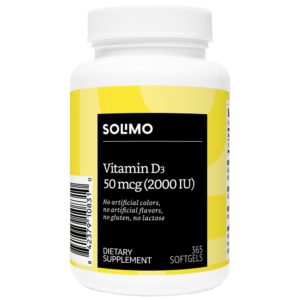
Solimo is an Amazon brand and one that is very reputable. Each pill, of the 350 per bottle, contains 2,000 IUs of vitamin D.
These pills are made using Safflower oil and contain no artificial colors, artificial flavors, gluten or lactose.
How We Rank
The first thing we looked at when analyzing our vitamin D supplements, was the dosage. Currently, medical recommendations stipulate that adults should take approximately 600 IUs per day, while those who are considered elderly should take 800 IUs per day. However, for those 19 and over, 1500 -2000 IU’s per day is considered adequate. This is why you’ll see all the products on this list, like Nature’s Bounty, provide at least 2000 IU’s per serving.
We did rank products providing more than 2000 IU’s higher. The reason being is that according to research, vitamin D deficiency may be as high as 42% – which means almost 1 in 2 people need more than 2000 IU’s per day. As such, you’ll see many of our high ranking spots taken by companies who opted for a 5000IU per serving dosage, like Essential Elements and Nuzena.
Aside from dosage requirements, we also focused on including products that contained a fat solution, like coconut oil. As vitamin D is a fat-soluble vitamin, fat is required for maximum absorption purposes. This meant that products deemed to be of higher quality needed to have a lipid solution to ensure the highest rate of success, like Smarter Vitamins D3 which contains avocado oil.
Purity was also of high importance when choosing the best vitamin D supplement available. While there are some additional nutrients or minerals, that can be included with vitamin D to enhance its potency, we wanted to avoid any products that included any artificial ingredients where possible. This included artificial sweeteners, binders, fillers, stabilizers or bloated ingredient lists with proprietary blends.
Those that included obscure ingredient content were immediately removed from the rankings. Products that included all-natural, non-GMO certified, or all-organic certification, like Sports Research, were also given higher preference as these distinctions would ultimately make for a higher quality supplement.
That being said, we did reward companies like, Smarter Nutrition and Nuzena, who added beneficial ingredients like vitamin k2 and calcium to their formulations. Vitamin D3 pulls calcium into the bloodstream, but it’s actually vitamin K2 that pushes calcium from your blood and into your bones.
Benefits
1. Vitamin D can prevent cancer. One study in 2008 showed that those with adequate amounts of sun exposure (usually five to ten minutes a day for at least three days a week) are less likely to develop any type of internal cancers (1).
This is because the vitamin D that we obtain from sunlight works in our bodies to help regulate calcium flow and build us up from the inside out.
Two other observational studies in 2006 found that adequate levels of vitamin D were correlated with lower risks of cancer (2, 3).
Another study from the European Journal Of Cancer Prevention had similar conclusions (4).
2. Vitamin D boosts the immune system and prevents the flu. As if all of these significant health benefits to adequate vitamin D intake were not enough, studies suggest that there are increasingly more and varied health benefits to vitamin D.
One of these is the prevention of viral and bacterial infections that can make us sick and prove severely damaging to our health, such as coming down with a cold. By working in our bodies on a cellular level, studies suggest, vitamin D helps our immune systems stay strong against external threats.
One study in 2010 showed that vitamin D3 supplementation during the winter may reduce the incidence of influenza A, especially in specific subgroups of schoolchildren (5).
Another 2011 study showed that low levels of vitamin D were correlated with increased respiratory illnesses (6).
3. Vitamin D can reduce fractures and strengthen bones. There has long been an established link between the intake of vitamin D and a reduction of bone disease. This is because vitamin D manages the calcium in our bodies that strengthen our bones and allow us to maintain mobility (7).
One study in 2005 showed that adequate (800 IU/day) vitamin D supplementation reduced the risk of hip and any nonvertebral fractures in ambulatory or institutionalized elderly persons. An oral vitamin D dose of 400 IU/day is not sufficient for fracture prevention (8).
4. Vitamin D can reduce the risk of multiple sclerosis. There are now links between adequate vitamin D sufficiency and a reduction in the likelihood of contracting autoimmune disorders, such as multiple sclerosis, or MS. A 2006 study in the Journal of the American Medical Association suggested that adequate levels of Vitamin D decreased the risk of developing MS (9).
Another study in 2014 showed that adequate vitamin d may slow the progression of multiple sclerosis for those who already have it (10).
5. Vitamin D supplementation can prevent type I and type II diabetes. Diabetes has become somewhat of an epidemic globally. Vitamin D supplementation to battle it. A study of 10,921 infants, followed since the day of birth, revealed that those who supplemented with 2.000 IU per day of vitamin D had a 78% lower risk of developing type I diabetes (11).
Another 2011 study in the European Journal of Clinical Nutrition found that vitamin D supplementation is linked to a reduced risk of adult-onset (type II) diabetes (12).
However, it should not be taken as a cure-all, as the links between vitamin D and diabetes are still not wholly proven. Furthermore, it is too much of a simplification to suggest that adequate levels of vitamin D are all that is required to prevent diabetes. Instead, a whole list of measures should be taken in order to maintain proper health.
6. Vitamin D can prevent heart disease and heart attacks. A study in 2008 showed that low levels of vitamin D are associated with a higher risk of myocardial infarction – even if all other lifestyle factors are perfectly in line with decreasing the likelihood of heart attacks (13).
Another study in 2008 concluded that Vitamin D deficiency is associated with increased incidents of cardiovascular disease (14).
7. Vitamin D boosts bone health in post-menopausal women. It has been shown that vitamin D plays an extensive role in strengthening the bones of postmenopausal women. Studies by dominant women’s health organizations have provided a link between vitamin D and a reduction in the hip fractures of senior women (15).
8. Vitamin D can reduce the risk of death. A study in 2011 found that the likelihood of mortality was decreased by 7% by those who supplemented with vitamin D, then those who did not (16).
9. Vitamin D can increase coordination and reduce falls. A 2007 study showed that Nursing home residents who supplemented with 800 IU of vitamin D per day had a lower number of fallers and a lower incidence rate of falls over 5 months than those taking lower doses (17).
10. Vitamin D can boost brain health to prevent dementia and Alzheimer’s. A 2014 study published in the American Academy of Neurology found that low levels of vitamin D were correlated with a 53% increase in developing dementia a 70% increase in developing Alzheimer’s (18).
What’s even scarier is that people with a severe vitamin D deficiency (which is not uncommon in the northern hemisphere) led to a 125% increase in the likelihood of developing dementia.
11. Vitamin D may help fight depression. It’s no secret that many people suffer from a mild depression during the winter months. A 2013 study showed that low levels of vitamin D were directly correlated with depression and the likelihood of developing depression (19).
Furthermore, a 2008 study showed that adequate vitamin D supplementation reduced the symptoms of depression in adults (20).
12. Vitamin D increases muscular strength. A 2017 study done by researchers at the University of Birmingham concluded that higher levels of vitamin D were correlated with an increase in muscular strength (21).
13. Vitamin D can help promote weight loss. A 2008 study out of Cambridge University showed that participants who supplemented with vitamin D were able to lose more weight than a placebo group (22).
14. Vitamin D may help deal with irritable bowel syndrome. A 2018 study noticed a link between low levels of vitamin D and IBS symptoms. It seems that increasing vitamin D supplementation among those with IBS help ease the problem (23).
However, much more testing needs to be done to confirm.
15. Vitamin D can help reduce acne. Acne can be caused by a variety of factors, one of them being bacterial overgrowth. If this is the case for you, vitamin D supplementation can reduce symptoms of acne due to its antimicrobial properties (24).
A 2014 study also showed that low levels of vitamin D were correlated with increased severity of acne symptoms.
16. Vitamin D can prevent hair loss and even restore hair growth. A 2012 study concluded that hair loss was correlated with low levels of vitamin D. It has also been shown that vitamin D can help promote hair growth by increasing follicle production (25).
17. Vitamin D can boost energy. A study in 2010 published in the Journal of Clinical Sleep Medicine confirmed a link between low blood level vitamin D and tiredness (26).
When the woman in the study increased her vitamin D supplementation, her hyper-insomnia symptoms disappeared.
18. Vitamin D can reduce back pain. A 2006 study showed a correlation between back pain and vitamin D deficiency (27).
19. Vitamin D can improve overall body healing. A 2011 study found that patients who had low levels of vitamin D experienced longer recoveries after their dental surgery than those who didn’t (28).
Another test-tube study published in 2016 found that vitamin D increases the production of wound healing properties in the body (29).
One more study found that low levels of vitamin D were correlated with high inflammatory markers which were directly linked to poor healing capabilities (30).
20. Vitamin D can reduce muscle soreness. A study in 2015 was done to determine the effects of vitamin D and pain. 120 children with growth pains were examined. After a single dose of vitamin D, the children reported that pain dropped 57% (31).
Side Effects
1. Vitamin D can cause nausea, vomiting and poor appetite in large amounts. A 2011 study showed that vitamin D toxicity led to nausea, vomiting and a poor appetite. It was concluded that this was due to high calcium blood levels from vitamin D toxicity (32).
2. Vitamin D can cause IBS like symptoms in large amounts. It’s been shown over and over again that very high levels of vitamin D can lead to stomach pain, constipation and/or diarrhea (33, 34).
However, it seems once blood levels are returned to normal, symptoms disappeared.
3. Vitamin D toxicity has shown to promote bone loss. One of vitamin K2’s most essential functions is to keep calcium in the bones and out of the blood. This keeps bones healthy and strong. Megadosing on vitamin D has been shown to be correlated with low serum blood levels of vitamin K2 (35).
As a result, bone loss is expedited.
4. Vitamin D can shut down your kidneys. In 2016, 62 adults were given extreme doses of vitamin D to see its effects on the kidneys, 100% of them developed kidney failure, even if they had perfectly healthy kidneys, to begin with (36).
5. Too much sun to get vitamin D can cause burns and potentially skin cancer. Because of this, it is vital to maintain a proper level of sun exposure (with occasional use of sunscreen) (37).
Despite all this, it’s important to note that vitamin D toxicity is very rare and only happens if you take very high doses for long periods of time (38).
6. There have been reports of people having allergic reactions to taking vitamin D. It usually results in a rash on the skin.
7. Vitamin D may affect blood sugar levels. Vitamin D has been linked to causing a change in blood sugar levels. For this reason, if you are someone who has diabetes you will want to consult with a doctor before beginning a vitamin D regiment.
8. Vitamin D may be toxic and cause hypercalcemia. Toxicity is what occurs when someone takes entirely too much vitamin D for far too long; weeks or months at a time. It is rare, but victims of vitamin D toxicity are in potentially life-threatening danger. It is important to use the supplement responsibly. There is a wide range of dosage you can take that would not be described as abuse. Operate within that acceptable range.
In the event of vitamin D toxicity, you may experience hypercalcemia. This means there is too much calcium in your blood. There are plenty of side effects associated with hypercalcemia, a few include headaches, nausea, exhaustion, muscle weakness, high blood pressure, etc.
Recommended Dosage
The RDA by the US government is 400IU for infants, 600IU for persons aged 1-70 and 800IU for adults 70 and older (39).
However, many experts believe that the RDA is way too low, especially for people who aren’t exposed to the sun a lot (40).
According to the Institute of Medicine, the safe upper limit is closer to 4,000 IU (41).
As such, 1000-2000 IU per day is recommended.
It’s important to note that nutrients usually don’t work in isolation – especially fat-soluble ones. It’s crucial to all be supplementing with vitamin A and K2 when supplementing with vitamin D as they all work synergistically (42).
FAQ
Which foods are high in vitamin D? Fatty fish such as tuna, salmon, and mackerel, beef liver, cheese and foods that are fortified with vitamin D which usually include orange juice, cereals, and milk.
What is the best way to absorb vitamin D? Sunshine is the best way to get vitamin D, but sunscreen blocks its production. Many people don’t have access to sunshine for most of the year.
Should you take vitamin D in the morning or at night? Because vitamin D temporarily stops the production of melatonin (the sleep hormone), it’s important to take in the morning instead of late at night.
What is the difference between vitamin D2 and vitamin D3? Vitamin D3 (cholecalciferol) is found in some animal foods, like fatty fish and egg yolks. Vitamin D2 (ergocalciferol) is found in some mushrooms. Of the two, D3 (cholecalciferol) is the one we’re interested in because it is almost twice as effective at increasing blood levels of vitamin D as the D2 form
Is vitamin D fat-soluble or water-soluble? Vitamin D is one of the fat-soluble vitamins (A, D, E, and K), meaning that it dissolves in fat/oil and can be stored in the body for a long time. As such, overdosing on vitamin D can build up to toxic levels much faster than overdosing with water-soluble vitamins.
Why is vitamin D called a steroid hormone? Vitamin D is turned into calcidiol, the storage form of the vitamin, which is then converted into calcitriol, the active steroid form. Calcitriol binds to the vitamin D receptor inside cells, turning genes on or off.
Other than the sun, which is the best source of vitamin D? Fish oil specifically, Codfish liver oil, is the single best source of vitamin D3. Fatty fish is also a good source, but you have to eat it very often to get enough.
Is vitamin D deficiency a problem? Yes, it is well known to cause rickets in children. However, more research shows that long-term vitamin D deficiency has many other detrimental effects throughout the entire body.
Do men and women both need to supplement with vitamin D? Both men and women benefit from supplementing with vitamin D, especially if they are deficient. Due to the strong link between vitamin D deficiency and osteoporosis, it can be argued that it is slightly more important for women to take vitamin D. This is because osteoporosis is a disease that is far more likely to affect women.
Is the evidence that vitamin D helps your body causal or correlative? At this point, most of the evidence supporting the benefits of vitamin D supplementation, or the issues with vitamin D deficiency, are correlative. Some of the correlative data is stronger than other data. With regards to vitamin D’s role in calcium absorption, that much has been proven indefinitely. (source)
How can I figure out if I need to supplement with vitamin D? The only way to be sure is to go to a doctor and have a blood test. If you live in an area where there isn’t as much sunlight, or if it simply isn’t as strong, there may be a good chance that you should be supplementing with vitamin D. However, there is an equally good chance that you are getting enough from your diet, so it’s best to check with your doctor before taking any supplements.
Is there a lot of uncertainty with regard to vitamin D in the medical community? Yes. There is even debate about how to interpret the results of blood tests with regards to vitamin D. With that being said, most doctors do agree that vitamin D deficiency is a bad thing. The most effective way to combat vitamin D deficiency is through the use of supplements.
What if I take too much vitamin D? Perhaps you purchased 5,000 IU capsules and you took three of them by accident, thinking it was something else. That’s okay, though you might have some discomfort such as a headache or stomach issues. It is not dangerous or life-threatening. However, if you take the entire bottle at once…that’s another story.
Are there food sources of vitamin D? Yes, there are multiple food sources of vitamin D available. Though vitamin D supplements have a solid reputation overall, vitamin D can also be obtained through the consumption of fatty fish such as mackerel and salmon, beef liver, cheese, egg yolks, and foods that have been fortified with vitamin D such as milk, orange juice, and specific cereals. In general, most consumers should able to obtain an adequate amount of vitamin D without the use of supplements if they partake in a well-balanced diet inclusive of these foods.
Are there additional ways to get vitamin D other than supplements? Yes, other than food consumption or supplements, vitamin D can be obtained through exposure to UV rays. Exposing your bare skin to the sunlight is the primary and recommended way to get an adequate amount of vitamin D as recommended by health professionals. If there is an impediment to direct sunlight, using a UV ray lamp is usually an acceptable substitution.
Are there different forms of vitamin D? Yes, there are two primary types of vitamin D: Vitamin D2 which is synthesized by plants and is not produced by the human body directly, and vitamin D3 which is produced by the body when UV rays come in contact with exposed human skin. Though both forms are beneficial to the human body, vitamin D3 tends to be the better option of the two. Vitamin D2 tends to yield a less effective outcome when reviewing liver absorption of the vitamin. For that reason, vitamin D3 is the preferred supplement option to increase vitamin D levels.
What are the symptoms of vitamin D deficiency? There are several symptoms identified with vitamin D deficiency. The most common of these symptoms are depression, getting sick or infected often, loss of bone density, bone loss, hair loss, and impaired wound healing. Though these symptoms could also be signs of other conditions, experiencing one or more of these simultaneously could point to low levels of vitamin D. If vitamin D levels are thought to be low, it is important to consult a physician regarding any concerns as soon as possible.
Can vitamin D deficiency be life-threatening? Inadvertently, yes. Though low vitamin D levels have yet to be directly linked to death, there has been an increasing number of studies showing an increased risk of death in those with vitamin D levels that are lower than average. Some studies have demonstrated that low vitamin D levels have been linked to heart disease, metabolic syndrome, and hypertension. As vitamin D has an anti-inflammatory effect, it is believed that a lack of this vitamin makes the body more susceptible to health issues which can be detrimental over time.
Is vitamin D beneficial for children? Yes, vitamin D is extremely beneficial for children. According to Mayo Clinic, children should receive vitamin D supplementation when needed at a fairly young age. As vitamin D plays a crucial role in bone development and helps to fight off infection, parents should ensure their children receive adequate amounts of vitamin D when possible. Children up to 12 months should receive 400 IUs of vitamin D per day, while children above the age of 1 should be given 800 IUs per day.
Can vitamin D help with sleep deprivation? Yes, vitamin D has been shown in several recent studies to help with sleep loss and deprivation. While more research is needed to provide conclusive evidence, it is believed that lower levels of vitamin D increase the risk of sleep disturbances and poor sleep quality.
Can vitamin D be useful for mood disorders? Yes, vitamin D has been shown in multiple studies to have a positive effect on those who suffer from depression or other mood disorders. Vitamin D is believed to be linked to the level of serotonin present in the human body. Low levels of vitamin D cause a decreased amount of serotonin, leading to an enhanced risk of depression or similar conditions. It is recommended that those experiencing these symptoms consult a physician to review the vitamin D levels present in their system to begin adequate treatment.
Recap
While it’s free to get vitamin D from the sun, you are more than likely deficient if you live in a place north of the hemisphere. Thus its worth your money to invest in a reliable vitamin D supplement.
That being said, there are many proposed health benefits to vitamin D intake, but these should not be taken as magical cures for a wide array of health problems. Instead, individuals should be aware of their health and the steps they may be able to take to prevent future health-related issues.
For Healthtrends #1 Vitamin D recommendation, click here.
